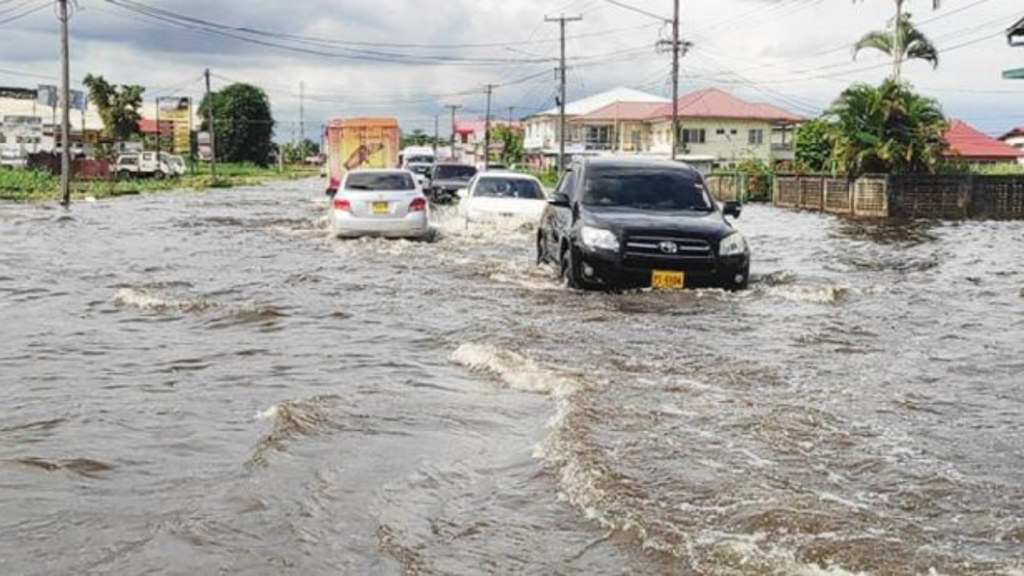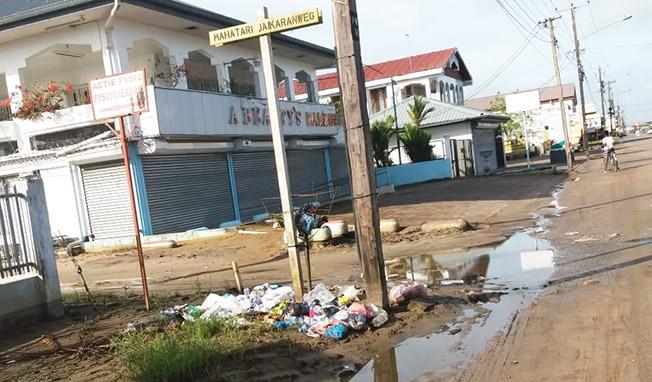After heavy rain, many streets in Paramaribo are flooded. Residents are getting water in their homes and have difficulty walking and driving. The government is seen as guilty, but is it really the case or does climate change also have something to do with this?
Minister Riad Nurmohamed of Public Works explains that Suriname has always suffered from flooding, “because we are low-lying”. The ministry tries to maintain and renew water management systems by keeping canals and sewers clean, changing locks and pumping stations across the country and rehabilitating river dikes. He recognizes the role of the government in flooding. “The major dewatering is a task for the government. Citizens are responsible for the gutters, so if they clean them themselves and do not throw bottles on the street, the problem would be minimized,” says the minister.
Lack of finances

The government’s biggest challenge in combating flooding is finances. The backlog of maintenance of waterway infrastructure and hydraulic engineering works is very large. State tax revenues are not enough to help with this. Renovating an estimated 100 locks, pumping stations and pumps nationwide will cost SRD 500 million. “In the 2023 budget, I received SRD 28 million for dewatering. This is the problem,” says the minister. He emphasizes that poor maintenance of channels and gutters, blockages in sewers and lack of sewage systems are the main problems in areas that are regularly flooded. Also, some areas have never been prepared for construction. Nurmohamed indicates that these problems can be solved with the construction of canals and pumps, but that there is no money.
More precipitation
In addition to the limited maintenance of infrastructure due to inadequate financial resources, our country is also susceptible to the consequences of climate change. Although climate change has changed precipitation patterns in Suriname, there is no significant change in the amount of precipitation per year. Radjkoemar Nanda, acting head of the Suriname Meteorological Service, explains that it appears as if there is more precipitation because heavy rains and downpours occur often and in a shorter period of time, leading to flooding.In general, local flooding throughout Suriname is also enhanced by the large mass of ocean water moved into the coastal area of Suriname by northeastern trade. This phenomenon prevents water levels in the rivers from falling sharply, causing accumulation of surface water on land. Another aspect is that during intensive rainfall the soil is eventually unable to absorb all the water.Low-lying coastal areas are sensitive to sea level rise, making inhabited areas along the coast such as Paramaribo, Nickerie and Commewijne vulnerable to flooding. Low-lying areas along the Suriname, Marowijne and Coppename rivers are also susceptible to flooding, especially during periods of intense rainfall. “In the short term, we must invest in warning systems, spatial planning and awareness to reduce the impact of climate change on flooding. “In the long term, we must pursue climate adaptation planning, sustainable water management and emissions reduction,” says Nanda.

Plastic waste
Environmental activist Erlan Sleur says that there is a lot of waste in our gutters, which are stuck in tubes, causing a lot of it to become clogged and the water to flow either unable to flow or to drain away too slowly. “If our drainage or dewatering channels, gutters or bartacks become clogged with waste, we should expect to experience flooding,” says Sleur. In various neighborhoods, but especially in Paramaribo, there are many PET bottles, plastic bags and portion containers after working hours. “We continue to consume, so the amount of waste will remain the same, but we can ensure that people use fewer PET bottles,” says Sleur. This can be achieved by ensuring that drinking water is clean, resulting in 30% fewer PET bottles being used.Sleur advocates the establishment of recycling centers at various locations to collect plastic and other waste for recycling. He also proposes introducing environmental taxes and partly deposits on plastic to finance the system. This system would ensure that at least 80% less waste ends up on the street. “Just information and education is not enough. The government must ensure that citizens have an alternative, but we don’t have that,” says Sleur. According to him, there are currently insufficient recycling options in Suriname, so international cooperation is needed to find solutions for processing all the plastic used. Failure to address this problem could lead to greater environmental problems.
This story was published by Starnieuws with the support of the Caribbean Climate Justice Journalism Fellowship, which is a joint venture between Climate Tracker and Open Society Foundations.